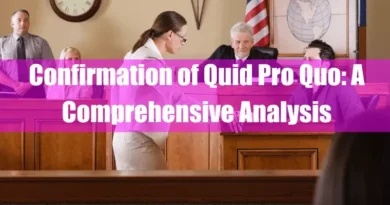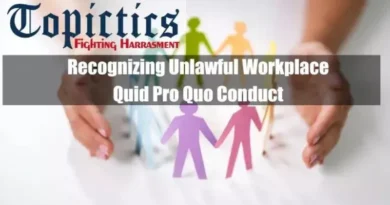How Are Bribery And Quid Pro Quo Related?
Takeaways
| Key Points |
|---|
| Quid pro quo and bribery are interconnected through the concept of an exchange, where something of value is traded for a specific action, but their distinction lies in legality and intent. |
| Quid pro quo, meaning “something for something,” is typically legal in reciprocal exchanges like business transactions, as long as both parties benefit without ethical breaches. |
| However, bribery, a subset of quid pro quo, is always illegal and involves offering or soliciting something of value to corruptly influence an official’s actions against their duties, as outlined in 18 U.S. Code Section 201. |
| The critical difference hinges on intent, with bribery involving deliberate manipulation to gain unfair advantages, often undermining public trust or legal obligations. |
| High-profile cases like Rod Blagojevich’s political bribery illustrate how quid pro quo becomes criminal when linked to corruption, emphasizing the importance of understanding these distinctions in legal, political, and business contexts. |
Introduction
Bribery and quid pro quo are terms often discussed together because they share a key element: an exchange where something of value is traded for a specific action. However, their relationship goes beyond just this exchange; while all bribery involves a quid pro quo, not all quid pro quo arrangements are illegal. Understanding how these two concepts overlap and differ is crucial in legal, business, and political contexts. This detailed explanation will explore their connections, legal definitions, and implications across various sectors.
Understanding Quid Pro Quo
Quid pro quo, a Latin term meaning “something for something,” refers to a reciprocal exchange where one party provides something of value in return for a service, favor, or item from another party. In most contexts, quid pro quo arrangements are legal. Everyday examples include paying for a service or exchanging goods—both parties benefit, and there is no coercion or illegal activity involved.
In legal terms, quid pro quo becomes problematic when it is applied in certain unethical or criminal contexts, such as bribery, extortion, or corruption. The key difference lies in the nature of the exchange. For instance, if a public official is offered money or favors in exchange for a favorable decision that benefits a private individual or entity, the quid pro quo turns into bribery.
Bribery: The Illegal Quid Pro Quo

Bribery is a specific and always illegal form of quid pro quo. It occurs when someone offers, gives, receives, or solicits something of value to influence an official’s actions in the course of their duties. According to U.S. law, under 18 U.S. Code Section 201, bribery involves three main elements:
- Offering or giving something of value.
- The intent to influence an official action.
- The intent for the action to be contrary to the official’s duties.
For example, if a contractor offers a public official a bribe to secure a government contract, even though the contractor is not the lowest bidder, this would be considered bribery. In such cases, the quid pro quo becomes illegal because it subverts fairness, transparency, and the legal duties of the officials involved.
The Role of Intent in Bribery and Quid Pro Quo
A critical factor that distinguishes bribery from a legitimate quid pro quo is intent. In bribery cases, there is a clear intention to corrupt the process or manipulate the actions of a public official. The offer or exchange is made with the goal of obtaining an unfair advantage or influencing a decision that the official should not be made under the circumstances. This intent to deceive or manipulate is what makes bribery illegal.
In contrast, a quid pro quo arrangement without corrupt intent may be perfectly legal. For instance, a company may offer better services to clients who sign longer-term contracts. This is a legal exchange where both parties understand the terms, and no laws are broken. It is only when one party offers something with the intent to undermine an official’s duty or public trust that the quid pro quo crosses the line into bribery.

Bribery in Politics: Quid Pro Quo in Corruption Cases
Bribery is particularly relevant in politics, where public officials hold significant power over contracts, legislation, and other important decisions. In these cases, even the perception of a quid pro quo can lead to scandal and legal consequences.
A well-known example is the case of Rod Blagojevich, a former governor of Illinois. He was convicted of soliciting bribes in exchange for political appointments, including an attempt to “sell” the U.S. Senate seat vacated by then-President-elect Barack Obama. This high-profile case illustrates how quid pro quo, when linked to bribery, can lead to serious legal consequences.
Differences Between Legal Quid Pro Quo and Bribery
Not all quid pro quo arrangements are inherently bad. In fact, in many sectors, they are standard practice. In business transactions, for example, a company may agree to supply goods or services in exchange for payment—a typical quid pro quo. These transactions are legal and form the backbone of commerce.
However, it is illegal when a quid pro quo arrangement occurs within the context of public service or government and involves the exchange of money, gifts, or services for political favors or influence. The critical difference lies in whether the exchange undermines ethical standards or legal obligations.
For example, a business providing campaign donations to a politician is not illegal by itself. However, if those donations are made with the explicit understanding that the politician will provide favorable legislation in return, the exchange may be considered bribery. This is where the line between a legal quid pro quo and illegal bribery can become blurred.
The Complex Relationship Between Bribery and Quid Pro Quo
In summary, bribery is always a form of quid pro quo, but not every quid pro quo is bribery. Quid pro quo simply means an exchange, and these exchanges are a natural part of both personal and professional interactions. However, when the exchange involves the corruption of public duties or the abuse of power, it becomes illegal, crossing into the realm of bribery.
The legal distinction between these terms often comes down to intent. Legitimate quid pro quo arrangements are common in business and other sectors, but when they occur with the intent to manipulate or corrupt official actions, they are illegal. Understanding this distinction is vital in contexts ranging from politics to business, ensuring transparency, fairness, and adherence to the law.
The penalties for bribery are significant, including fines, prison sentences, and disqualification from public office, reflecting the serious nature of this crime.
FAQ
What is the relationship between bribery and quid pro quo?
Bribery and quid pro quo are intrinsically linked. Bribery involves offering something of value to influence an official act, establishing a quid pro quo—a reciprocal exchange where one action is given in return for another. This corrupt arrangement undermines the integrity of public office and erodes public trust.
How does quid pro quo relate to bribery?
Quid pro quo, meaning “something for something,” is central to bribery cases. In such scenarios, an individual offers a public official something of value to sway their actions, creating a corrupt exchange. This undermines the fairness of governmental processes and violates legal and ethical standards.
Is all quid pro quo considered bribery?
Not all quid pro quo arrangements constitute bribery. In legitimate contexts, such as business contracts, goods or services are exchanged lawfully. However, when the exchange involves a public official and aims to influence their official duties, it crosses into bribery, violating legal and ethical boundaries.
How does bribery differ from extortion?
While both involve corrupt exchanges, bribery entails offering something of value to influence an official act, establishing a quid pro quo. Extortion, on the other hand, involves obtaining something of value through coercion or threats. The exchange is typically consensual in bribery, whereas extortion relies on intimidation.
Can a quid pro quo be legal?
Yes, quid pro quo arrangements can be legal. For instance, in business, parties often exchange goods or services of equal value, which is lawful. However, when such an exchange involves a public official and seeks to influence their official actions, it becomes bribery, breaching legal and ethical standards.
What constitutes a quid pro quo in bribery?
In bribery, a quid pro quo involves offering something valuable to a public official in exchange for a specific official act. This corrupt agreement undermines the integrity of public office and violates legal statutes designed to prevent such misconduct.
How is quid pro quo proven in bribery cases?
To prove quid pro quo in bribery cases, prosecutors must demonstrate a direct link between the thing of value offered and the official act performed. This involves showing that the public official accepted the item intending to be influenced in their official duties, establishing a corrupt agreement.
What are the legal consequences of bribery?
Bribery carries severe legal consequences, including substantial fines and imprisonment. For example, under U.S. federal law, individuals convicted of bribery can face up to 15 years in prison and fines up to three times the value of the bribe. Additionally, they may be disqualified from holding any office of honor, trust, or profit under the United States.
How does quid pro quo relate to sexual harassment?
In the context of sexual harassment, quid pro quo occurs when someone in a position of authority demands sexual favors in exchange for employment benefits or to avoid negative consequences. This form of harassment exploits power dynamics and creates a hostile work environment, violating employment laws and ethical standards.
Can quid pro quo be considered extortion?
Quid pro quo becomes extortion when one party uses threats or coercion to obtain something of value from another. In such cases, the exchange is not voluntary but compelled through intimidation, distinguishing it from consensual quid pro quo arrangements.
How does bribery affect public trust?
Bribery erodes public trust by creating a perception of corruption within governmental institutions. When officials engage in bribery, it undermines confidence in the fairness and integrity of public administration, leading to cynicism and decreased civic engagement among citizens.
What is the role of quid pro quo in political corruption?
In political corruption, quid pro quo arrangements involve politicians accepting bribes in exchange for favorable policies or actions. Such corrupt exchanges compromise the democratic process, as decisions are influenced by personal gain rather than the public interest, leading to policies that may not reflect the people’s will.
How does bribery impact businesses?
Bribery distorts market competition by granting unfair advantages to certain entities. Companies that engage in bribery may illicitly secure contracts or favorable treatment, disadvantaging competitors who operate ethically. This not only harms individual businesses but also undermines the overall integrity of the market.
What is the difference between bribery and lobbying?
Lobbying involves advocating for specific policies or interests through legal and transparent means, often by providing information to influence decision-makers. Bribery, however, entails offering something of value to a public official to influence an official act, establishing a corrupt quid pro quo. The key distinction lies in legality and transparency; lobbying is lawful when conducted appropriately, whereas bribery is illegal and secretive.
How does bribery relate to organized crime?
Organized crime groups often use bribery to influence public officials, law enforcement, or other authorities to facilitate their illegal activities. By corrupting officials, these groups can evade law enforcement, secure protection, or gain access to confidential information, thereby entrenching their criminal enterprises.
What is the significance of intent in distinguishing between bribery and legal quid pro quo?
Intent is crucial in differentiating bribery from lawful quid pro quo arrangements. In bribery, a deliberate intention is to influence a public official’s actions by exchanging value and establishing a corrupt quid pro quo. Conversely, legal quid pro quo transactions, such as standard business contracts, involve mutual exchanges without intent to corrupt or unlawfully influence.
How do anti-bribery laws address quid pro quo arrangements?
Anti-bribery laws specifically target quid pro quo arrangements that involve corrupt exchanges intending to influence public officials. For instance, U.S. federal law under 18 U.S.C. § 201 criminalizes offering or receiving anything of value with the intent to influence an official act, thereby prohibiting corrupt quid pro quo transactions.
Can after-the-fact gifts be considered bribery?
After-the-fact gifts, often called gratuities, can be considered bribery if given as a reward for an official act, implying a prior corrupt agreement. However, the U.S. Supreme Court has held that federal bribery laws apply only to quid pro quo exchanges and do not extend to after-the-fact gratuities unless there is evidence of a prior agreement.
How do courts determine the existence of a quid pro quo in bribery cases?
Courts assess the existence of a quid pro quo in bribery cases by examining evidence that demonstrates a clear agreement between the parties involved. This includes evaluating communications, the timing of exchanges, and any explicit or implicit understandings that the thing of value was given in return for a specific official action. The prosecution must prove that the public official accepted the item intending to be influenced in their official duties.
What recent legal developments have impacted the interpretation of quid pro quo in bribery cases?
Recent legal developments, such as the U.S. Supreme Court’s decision in Snyder v. United States, have narrowed the interpretation of quid pro quo in bribery cases. The Court held that federal bribery laws apply only to explicit quid pro quo exchanges and do not extend to after-the-fact gratuities unless evidence of a prior corrupt agreement exists. This ruling has significant implications for prosecuting bribery cases and the types of evidence required to establish a quid pro quo.









